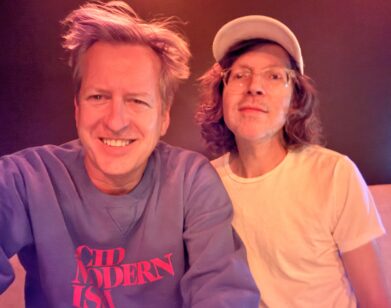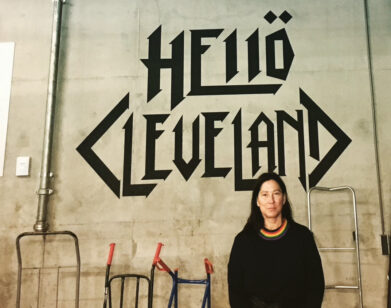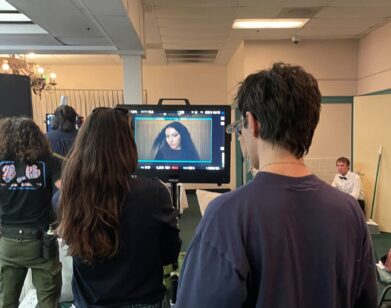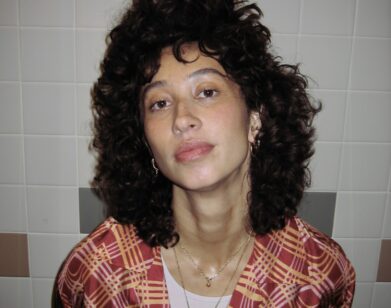Loutallica
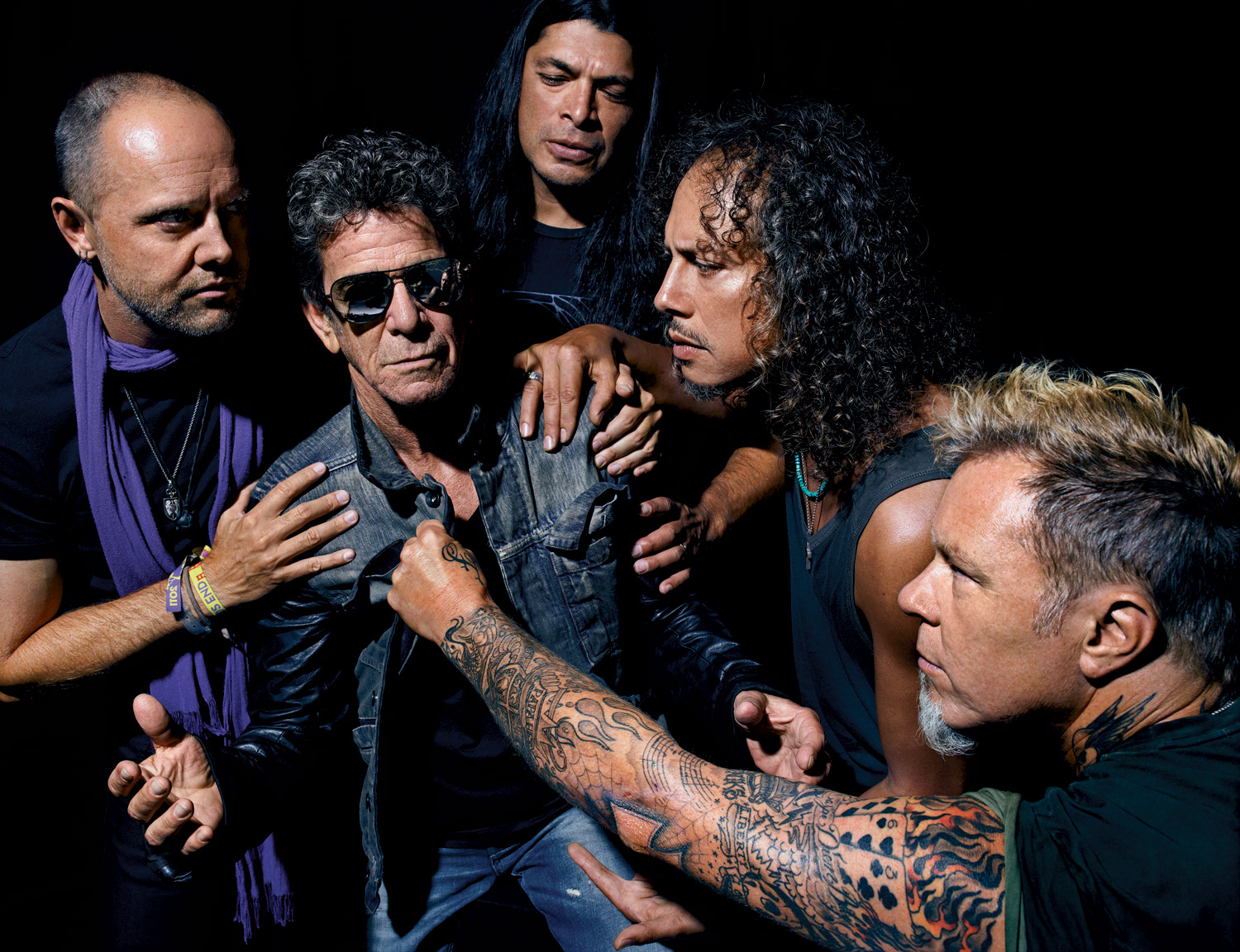
Photo: Metallica (from left: Lars Ulrich, Robert Trujillo, Kirk Hammett, and James Hetfield) with Lou Reed (center) in New York, September 2011. From left to right: On Ulrich: T-Shirt: CK One. Scarf: David Mayer Naman. Necklaces: Ulrich’s own. On Reed: All clothing and sunglasses: Reed’s own. On Trujillo: T-Shirt: Trujillo’s own. On Hammett: Tank top: All Saints. Jewelry: Hammett’s own. On Hetfield: T-Shirt: Polo Ralph Lauren. Necklace: Hetfield’s own.
These are my soul brothers. they are my spirit brothers. They are my metal brothers.Lou Reed
“I would cut my legs and tits off, when I think of Boris Karloff,” mutters Lou Reed at the beginning of “Brandenburg Gate,” the first song on Lulu (Warner Bros.), a compelling and deeply weird new album by Reed and Metallica. Ummm. What? Okay, let’s back up. The seeds of this unexpected collaboration were sown back in October 2009, at the 25th Anniversary Rock and Roll Hall of Fame Concerts in New York City, when Reed and Metallica were paired for performances of “Sweet Jane” and “White Light/White Heat.” Reed and the legendary metal band briefly discussed the idea of working together again, originally to re-record some of Reed’s lost nuggets. But a few weeks before sessions were to begin in Metallica’s Bay Area studio, Reed changed the game plan, suggesting instead that they record an album of songs based on plays by a late-19th-early-20th-century German writer, Frank Wedekind. Lulu, the main character in these plays—and on the ensuing album—is an amoral seductress whose sexual magnetism destroys just about everyone who comes in contact with her. The music, for the most part, follows hardly any rules: There are only two songs with typical verse-chorus-verse structures. With the exception of a pair of jaw-droppingly beautiful ballads, the rest of the 89-minute album is a disturbing but fascinating mix of Metallica’s precision thrash-and-burn hard rock trailing gamely along with Reed’s gravelly, almost monotone vocals. Whether you love or hate Lulu, there is nothing like this album anywhere else in the world of music. It is stunningly original. When I sat down with Reed, 69, and Metallica’s drummer Lars Ulrich, 47, and front man James Hetfield, 48, at the Trump SoHo in Manhattan, the mood was pure love: Reed, a bit grumpy but playful, sunk into his chair, wearing a leather-and-denim jacket, and making the Metallica men seem like cheerful puppies by comparison. In the end, though, they were three guys who could not have been more thrilled at the strange new musical amalgam they stumbled upon.
DIMITRI EHRLICH: You guys first met while rehearsing for the Rock and Roll Hall of Fame Concerts. What was your first experience like of actually playing together? Was it the rehearsal for the songs that you guys did?
LARS ULRICH: Lou walked in and saw all the amplifiers and was terrified!
LOU REED: I don’t know if terrified is the word . . . I’m not supposed to stand in front of that shit, man. [all laugh]
ULRICH: After 15 minutes of that, we were all hugging. I mean, Metallica. Lou Reed. It was very obvious to us. You know, I’ve seen Lou in New York. We have places near one another.
EHRLICH: So you’ve seen each other around?
ULRICH: Yeah, we’ve exchanged pleasantries.
REED: [in high, lilting voice] “Good morning, Lars!” [in low, gravely voice] “Whatever.”
ULRICH: We got a chance to take it up a notch in the rehearsal room. It was the beginning of this fabulous lovefest.
EHRLICH: What are your first memories of Lou Reed? Obviously, Lou’s career predates yours by probably 20 years.
REED: Well, not quite 20 years.
EHRLICH: You started with The Velvet Underground in the mid-’60s, and Metallica started in ’81, so you were an icon by the time they were starting.
REED: An icon! I like that. I should have a shoe line, you know?
ULRICH: My first memory was of . . .
REED: Would you wear my shoes, Lars?
ULRICH: As soon as you make them, I’ll wear them! But my earliest memory is, like, ’69, ’70,’71, around the house. There was a lot of music. It was a very social vibe, and the soundtrack was Hendrix, The Doors, Velvet Underground, Coltrane, Miles, Ornette Coleman, and Sonny Rollins. The Velvet Underground was very much a part of the rock side of what was going on in my dad’s world at that time, and that certainly rubbed off on me. I rebelled a little bit against that a few years later by starting to go into some things that were slightly heavier. But those were the first memories.
EHRLICH: What about you, Lou? What’s your first memories of Metallica? When did you first become aware of them? Were you a fan?
REED: I’ve been a fan of rock—all kinds of rock—forever. But I never remember the name of anybody—except maybe Al Green.
EHRLICH: So when you got the call to do the Rock and Roll Hall of Fame and you were paired with Metallica, you weren’t like, “This is the band I want to work with”?
REED: I was very excited.
EHRLICH: A lot of your live stuff has been pretty heavy.
REED: The live stuff is heavier than the recorded stuff.
EHRLICH: How did the writing proceed? Lou, you had written the lyrics, but did you guys all get together and write the music together?
REED: I came in with lyrics set to an electronic music score. What I really wanted was for them to absorb it and put it out their way—and that’s exactly what we did. The original one had, like, more guitar, synthesizer, and a thing called a Continuum.
EHRLICH: What’s a Continuum?
REED: It’s built by this engineering professor in Illinois, and it looks like a keyboard, but it’s not. You can almost make it talk. It has keys painted on it, but it doesn’t really have keys. It’s absolutely crazy. Anyway, it’s a mixture of that and the Moog guitar synth. It’s an astonishing instrument. Plus some cello—that’s the mixture that I went to them with.
ULRICH: But it had no drums, no electric guitars, no recognizable chords or keys or anything.
REED: Well, I had my incredible acoustic Froggy Bottom 12-string. I’m in awe of that thing.
EHRLICH: Is any of that on the final version of the record that I heard?
REED: Yeah! But then I would sit and listen to James [Hetfield] playing these amazing guitar riffs to this stuff, and I was like, “I can’t do that, but he can!” I would just say, “That’s really great, can we do that?” Not only could we do that, we did do that! And then Lars would play very sophisticated drums—because two of the songs are verse-chorus, but the rest aren’t because I wanted to do a vocal that wasn’t like that. It was like operatic in theory, but not “Aaahhh . . .” and that kind of singing. No one wanted that. I didn’t want that. But I did want to have the freedom of moving melody around and not worrying about key and this and that—of just kind of acting it and singing it at the same time. So that’s what we did. Lars would come up with these astonishing drums that were powerful and punctuated. And James is a genius at these licks. You know, he doesn’t need an electric guitar to do it! He sits there on an acoustic and does it. He could do it all day. And Kirk [Hammett, lead guitarist for Metallica], you know, he’s like a speedster. You know? [makes shredding guitar sounds]
EHRLICH: So tell me a little about the plays that this album was based on. Frank Wedekind wrote them in the 1890s. Then Robert Wilson [the artist, director, and playwright] approached you, Lou, to adapt them.
REED: He’d done an adaptation of them for the stage, and he wanted me to put them to music, and I had a lot of trouble with that, because I couldn’t understand the play the way they’d written it. So I went back to the original. I started at the end going back, and I looked at it with my significant other, Laurie [Anderson], who has a very precise mind, and she said, “Okay, from here to here is this, and from here to here is this, and let’s stop there . . .” And I’d go home and think about it. That was basically it, trying to find the emotion driving these characters, which I couldn’t find in Bob’s play. But it runs through Wedekind’s thing. I don’t know whether he has the main character killed at the end because the morality at the time demanded that a woman like that has to die. But anyway, I was following that plot. It was also an outlet for various views of a certain kind of person and the way she treats other people. And I just thought, “What a vehicle for a certain kind of writing!” And that’s what I gave to Lars and James. I said, “Would you guys consider doing this?” And then I sat and prayed. [James Hetfield and Ulrich laugh] Because really, you have no idea how much I wanted to do this with them—because they were the guys who could do this. I knew that from us playing together. Would they like to go on this little adventure? Because there isn’t anything like this in existence.
EHRLICH: Originally you were planning to make a record of some of your old songs though, weren’t you?
REED: We were gonna do unrecognized pearls—you know, distinguished nuggets of the past.
EHRLICH: How did the project shift?
REED: Well, because this was completely new and hadn’t been done at all. You couldn’t compare it to anything because it hadn’t been done! And you didn’t have to listen to the other things and say, “Oh, he’s doing this, he’s doing that.” We didn’t even have to deal with that, this was fresh, right out of the ground.
EHRLICH: You’re singing mainly from the point of view of this girl who’s got a very complicated sexual morality. What were the challenges of that?
REED: Well, she’s amoral. There’s a few ways of looking at it. You could say she’s amoral. You could say she’s cold. Or you could just say she’s having a good time, and what’s your fucking problem?
EHRLICH: She’s kind of modern, in a way—ahead of her time.
REED: Yes. I was thinking that, as a matter of fact. But the whole play is littered with people who fall in love with her and then she doesn’t care, so she moves on, and they’re distraught and they kill themselves.
EHRLICH: Yeah. I think I’ve met her. [all laugh]
REED: I was saying, “Is there a man amongst us who has not run into something like that?” That stuns you with the brusqueness of the adventure? I thought we had something.
EHRLICH: It’s interesting that you’re writing a lot from her voice. You’re singing a lot from her character’s point of view.
REED: Well, I jumped into that head because I don’t want to hear my point of view particularly. It’s like, “I have to live with him at night!”
JAMES HETFIELD: It gives it a lot of dimension, too. She’s a villain, and the most beautiful thing ever, and man’s ruin.
REED: I was writing it from her point of view, but also from the point of view of the doctor who marries her, and then she’s going to bed with him and the son, and the play starts off with the guy falling over dead from the whole thing. So writing from the points of view of this woman who has just destroyed them, and then from the princess who meets her, and she’s straight but suddenly like . . . She’s never felt that way before. Welcome to the club, okay? [laughs] But that was very, very exciting, occupying the minds of these different people—and the real thing was, having done that, to be able to sing them without the verse-chorus thing in the limited vocal range that I have. So that involved playing around with the phrasing a lot, and banking on Metallica to give the substance to hold it up. Not just my electronic stuff. This was not complicated. This was, “You get it or you don’t.” And if we hadn’t, it would have been a half hour in the studio, and they would have been glad to be rid of me, and I would have gone back to my little cave in the West Village and cried myself to sleep, waving to the ships passing . . .
ULRICH: Waving to California . . .
EHRLICH: How fast was the whole record made?
ULRICH: Lou and [music producer] Hal Willner came out to the studio on a Monday to check it out and look at some production and equipment things and all that horseshit. But they walked in and felt the vibe instantly, and we were recording within 30 minutes. By the time that the first week had gone, we were six or seven songs into it.
REED: We were at least halfway there.
ULRICH: I mean, our heads were spinning. It moved so fast. I’ve never worked like that.
EHRLICH: Because you guys have spent a year making records in the past.
ULRICH: Oh, we’ve spent a year just trying to find the studio. Obviously, with Lou, we figured out quickly that there was rarely a second take.
EHRLICH: James, with Metallica you’ve always had the responsibility of being the singer and the primary lyricist, but with this project, you had someone else singing and writing the lyrics, so you were free to focus on the guitar playing. Was that rewarding or limiting?
HETFIELD: Well, I’ve always dreamed of just being the backup singer and being able to run and jump around and be the ultimate riff master, you know? But being the front man is neither a burden nor a responsibility. It’s a gift, and I’m glad that I can both do that and play guitar because when I break my arm, I can still be the singer. It’s job security. [laughs] But it was very freeing. It almost felt like I was more part of the band and less the singer guy or the lyricist. You know, you can have an amazing song and you’ve got a crap lyric on it, and you just . . . if you knew the lyrics on some of the songs that are really popular, you’d go, “What the hell?”
EHRLICH: There’s a funny scene in Metallica: Some Kind of Monster [2004] where the whole band have notepads and everyone gets to write on them and add to the song’s lyric. Having seen that, I was thinking, to a certain kind of lyricist, it would probably make your hair go on fire.
HETFIELD: My hair was on fire. But that was part of that whole process: discovering how open I can be and where my boundaries are. Lyrically, vocally, I feel insecure quite a lot. But when it comes to writing a riff or playing guitar, I have the utmost confidence. So I got to live in the confident department.
EHRLICH: I have heard that a lot of Metallica fans view this collaboration with Lou Reed as sacrilege.
REED: Have you seen the Hitler thing on YouTube?
EHRLICH: Where they dubbed in the other words? Is there one about this album now?
ULRICH: It’s from the movie Downfall [2004]. REED: Yeah. I think they’ve done a few of them, and there’s this one where he says, “What are they doing? They’ve brought in that sack of shit Lou Reed! Is this the end of Metallica?”
ULRICH: The guy says, “When you listen to Master of Puppets [1986], do you sit there and go, ‘It would be more brilliant if Lou Reed was singing on it?’” EHRLICH: Now, I don’t think Lou Reed’s fans would feel that way. But to some Metallica fans, it’s a betrayal. REED: They’re gonna be delighted.
ULRICH: I appreciate what you’re saying. They have loud voices, but they’re small in numbers. Obviously, the Internet gives everybody a loud voice. But I think that by far the majority of Metallica fans are open to anything. The real fans who’ve been on this fuckin’ journey with us for 30 years know that in order for us to survive creatively and mentally, for our own well-being, for Metallica’s well-being, we need the fuckin’ journey to take us all over the place or else we’d just die! It’s that simple. We’ve done stuff with Michael Kamen, the British blues stuff on Load [1996]—all kinds of stuff. So I would like to think that it’s been a very varied ride. We’ve had issues with those kinds of conservative approaches in the hard rock community. They existed in the hard rock community before we started playing hard rock. Very early on, James and I were talking about how we never wanted to be stuck in what the hard rock community was expecting and wanting from us, and we’ve rebelled against that at different levels—sometimes maybe too much. But we’ve always fought for elbow room and fought for our own ground to stand on.
HETFIELD: It’s not so much conservative either. It’s fearful. There are fearful people who are probably typing from their mom’s basement that they still live in. They’re afraid to move on or to experience life. They need that safety, and if something that they have embraced in their life that’s speaking for them changes, they don’t know what to do. I totally get that, too. It can be a scary thing when your favorite artist of all time tries something new. But like Lars says, we’re artists and we have to spread our wings. How do you know you’re not supposed to go somewhere until you go there?
EHRLICH: Watching Some Kind of Monster, it was obvious how intimate and intricate the chemistry is amongst the band members of Metallica. I was wondering how bringing a personality as complicated as Lou’s into the mix affected the kind of brotherhood.
REED: Well, I’m no more complicated than they are.
EHRLICH: Everyone’s complicated.
ULRICH: I hate the word rules, but the only kind of thing that we talked about beforehand was we were not gonna move forward on any ideas if we were not all in sync. We weren’t gonna get into a voting system; if all five of us were not really embracing a particular idea, then we’re not gonna move forward with it. With that type of fallback position, you can’t lose. At one point we talked about bringing in some fairly well known names for some collaborations, and we were not all feeling that in sync, so that got sacked. But there really were no confrontations or, you know—
REED: I still wish you had let Madonna do the backup vocals.
ULRICH: I still wish you’d give me that fuckin’ jacket! But I think we’re soul mates, in the fact that we come from a place of autonomy. We come from living and being in our own bubbles. We don’t play music-business games. Lou has never played any of those games. And we certainly feel left of center, outside the mainstream, and Lou has created the blueprint for that type of existence in music for 40 years. So, I think we’re musical soul mates, and for all the people that sit there and scratch their heads at this odd and strange collaboration, I don’t think that they really understand truly who we are as artists.
HETFIELD: No one got pregnant. No one died.
EHRLICH: What surprised you most about this experience?
REED: They were just even greater than I thought they were. These are my soul brothers. They are my spirit brothers. They are my metal brothers. There’s no ifs, ands, or buts about it. Every time we’re there, there it is. Every time I listen to the record, I pray to God I was so lucky to meet these guys.
ULRICH: That’s a hard statement to follow . . . He was okay. [all laugh] But the magnitude of this record is probably the most surprising thing. This will take years to shake down in terms of what impact it will have on us and how it will inspire us in the future, and what our real thoughts and feelings are.
HETFIELD: I’d say for me, the surprise was that I didn’t know we could make a record in ten days. And I think I’ve learned a lot from Lou’s demeanor, his mannerisms, his way of speaking—
ULRICH: And his dress sense.
HETFIELD: Well . . . yeah. [all laugh] But he’s really not placating anything or anyone. He is a hundred percent Lou, and I love that.
REED: Well, if you really love rock, and you’re devoted to it, then you’ve not passed beyond that and said, “Oh, that was like a kid thing. Now, I’m gonna grow up and listen to something else.” If you say, “I want more rock. I want rock an adult can listen to. I want to still have the pleasure of rock. I don’t want to have to have it dumbed down for me”—if you want to be able to continue to get that thrill that only rock can give you . . . then that’s what this record is. You know, this is the end of old European classical music. It’s dead and buried once and for all. But this is the new breed, the new generation of classics—rock classic . . . Power.
EHRLICH: When you look back on an experience like this, there’s usually one memory that will pop in your head, like when you’re older and you’re kind of remembering the experience—
REED: When I’m older, I don’t want to think. [laughs] If I’m taking pills for Alzheimer’s, then I don’t know what I’ll have to say about all that. But this has been the thrill of a lifetime. This is the kind of thing you exist for. Ulrich: For me, it’s just been being around Lou. In the beginning, in the first week or something, I would sit and stare at him—like, “Oh my god, Lou Reed is just sitting here in our studio and I’m making a record with him!” And what’s funny is that he’d look over at me with some yogurt on his cheek or something.
HETFIELD: Everyone was telling us, “Lou doesn’t leave New York. You’re gonna have to go there.” So when he showed up in California, we were pretty excited and blessed that he liked the place. He didn’t have all of his comforts of home. I remember he asked his assistant to call the hotel to make sure they get him a sword.
EHRLICH: A tai chi sword?
HETFIELD: Yeah. I knew nothing about his tai chi background. I was like, “Wow. I like this guy.”
EHRLICH: It’s hard to fly with a sword these days. You’ve got to get the collapsible plastic one.
REED: Those things are dangerous because they come apart. I wanted them to get me a broadsword and a straight sword—and then while they were at it, if they had a spear, that would be nice.
HETFIELD: A spear would be nice.
Dimitri Ehrlich is a contributing music editor for Interview.


